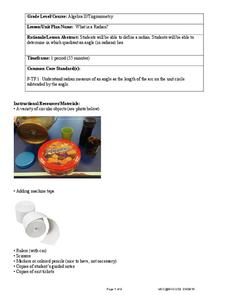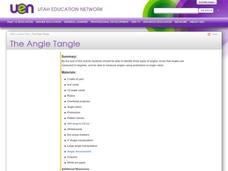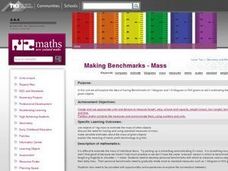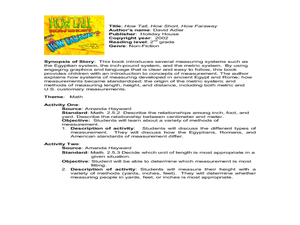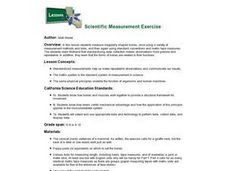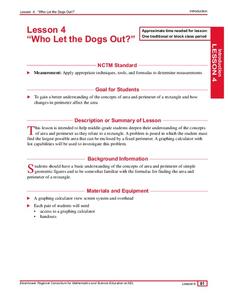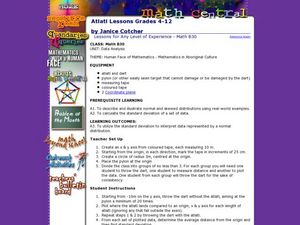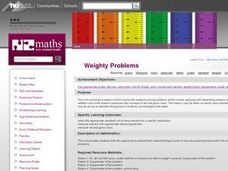West Contra Costa Unified School District
What Is a Radian?
Here's an algebra II activity that strives to make the concept of a radian less abstract and more conceptual. It takes a hands-on approach to exploring the idea of a radian and allows individuals to develop a definition of a radian...
Curated OER
Angles
Fourth and fifth graders investigate angles and name them according to the criteria for obtuse, acute, and right angles. They examine a human-made yarn pattern on the floor of their classroom and identify angles, vertices, and types of...
Texas State Energy Conservation Office
Investigation: Conservation of Energy
By rolling marbles down a six-foot length of track, physical scientists determine how much energy is lost to heat. It is recommended that you opt for the foam pipe insulation track because more friction slows the marble, allowing...
Curated OER
Making Benchmarks - Mass
Elementary schoolers predict the mass for different objects. Then, using objects of 1kg mass, they make a more precise prediction. Afterwards, they discuss the need for having and using standard measures of mass.
Curated OER
Measuring Mania
Second graders turn into measuring maniacs with this activity! With real world objects, 2nd graders practice measuring accurately to the nearest inch and centimeter. After a lecture/demo, students practice with a worksheet imbedded in...
Curated OER
Estimating And Measuring Weight: Grams And Kilograms
In this measuring worksheet, students will estimate the weight of 10 objects and record information in grams and kilograms. Then students will weigh the objects and record the actual weight to complete a table.
Curated OER
Estimating and Measuring Capacity: Millilitres And Litres
For this estimating and measuring worksheet, learners will estimate the capacity of 10 objects and record information in liters and milliliters. Then students will measure the actual capacity of these objects and record to complete a table.
Curated OER
Introduction to Measuring Length in Customary Units
Young scholars explore customary units of measurement. Students use yardsticks, rulers, and adding machine paper to measure specific units as directed by the teacher. Through completing this hands-on activity, they actively investigate...
Curated OER
How Big is a Foot?
First graders practice nonstandard measurement and estimating and measuring lengths of objects.
Curated OER
Whatcha Gunna Do When the Hulkster's Measuring Too??
Students measure using tools they have made. In this algebra lesson, students measure the height and distance using non-traditional measuring methods. They apply their findings to algebra and trigonometry properties of measurements.
Curated OER
The Changing Me
Third graders study the human body. In this health lesson, 3rd graders discuss that everyone's body is growing, measure body parts using a tape measure, and color the body worksheet.
Curated OER
How Tall, How Short, How Faraway
Second graders determine the correct unit of measure to use for different situations. In this measuring lesson, 2nd graders are introduced to different unit of measure. Students study the origin of measurement and practice measuring....
Curated OER
Inch By Inch
Students explore the concept of measuring length using a one-inch pipe cleaner "inchworm." They listen to the story "Inch By Inch by Leo Lionni and discuss how the animals were measured by the inchworm in the book. In pairs students...
Curated OER
Scientific Measurement Exercise
Students measure irregularly shaped bones, once using a variety of measurement methods and tools, and then again using standard conventions and metric tape measures. They explore firsthand that standardizing data collection makes...
Curated OER
Bedroom Floor Plan
Students identify and compare the characteristics of floor plans and zoning to family activities and needs. They draw an accurate floor plan--either existing or a work in progress to scale. Then, students roughly sketch their bedroom...
Curated OER
Tantalizing Tangrams
Students explore "area." In this tangram geometry and measurement lesson plan, students arrange tangram pieces to find the area of characters presented in a story they listen to on a website. Website information and related worksheets...
Curated OER
Who Let the Dogs Out?
Students examine the concepts of area and perimeter and how they relate to a rectangle. They find the largest possible area that can be enclosed by a fixed perimeter and complete a worksheet as well as create a table of all the possible...
Curated OER
Human Face of Mathematics - Mathematics in Aboriginal Culture
Students collect statistical data. In groups, students play a dart game and then determine the distance between darts. They collect the data and plot the information on a coordinate plane. They identify the mean and the standard...
Curated OER
Sliding Along
Third graders explore the concept of linear measurements and how they work. Coins are used to reinforce the process.
Curated OER
Metric Meals
Sixth graders investigate metric measurements. In this metric measurement lesson, 6th graders explore mass, capacity, and length. Students examine graduated cylinders and balance scales to obtain measurements. Resources are provided.
Curated OER
Mass: Applying and Interpreting
Students rotate through six studying stations solving problems that involve applying and interpreting aspects of mass. They solve various word problems, and measure the contents of cans and calculate the mass of two cans.
Curated OER
Henry's Freedom Box
Third graders create a shipping box from a cardboard material. For this measuring lesson, 3rd graders read the book Henry's Freedom Box and discuss the main idea. In the story a slave ships himself to freedom and the students measure and...
Curated OER
Pan Balance: Shapes
Students explore the concept of equivalence as it relates to comparing concrete objects to determine greater or lesser attributes such as length and weight. In this pan balance-shapes instructional activity, students make estimations...
Curated OER
Measure Twice
Learners measure a variety of objects using the appropriate measuring tool. In this measurement lesson, students explain the importance of accuracy and precision in collecting data. They discuss the difference between the two.


